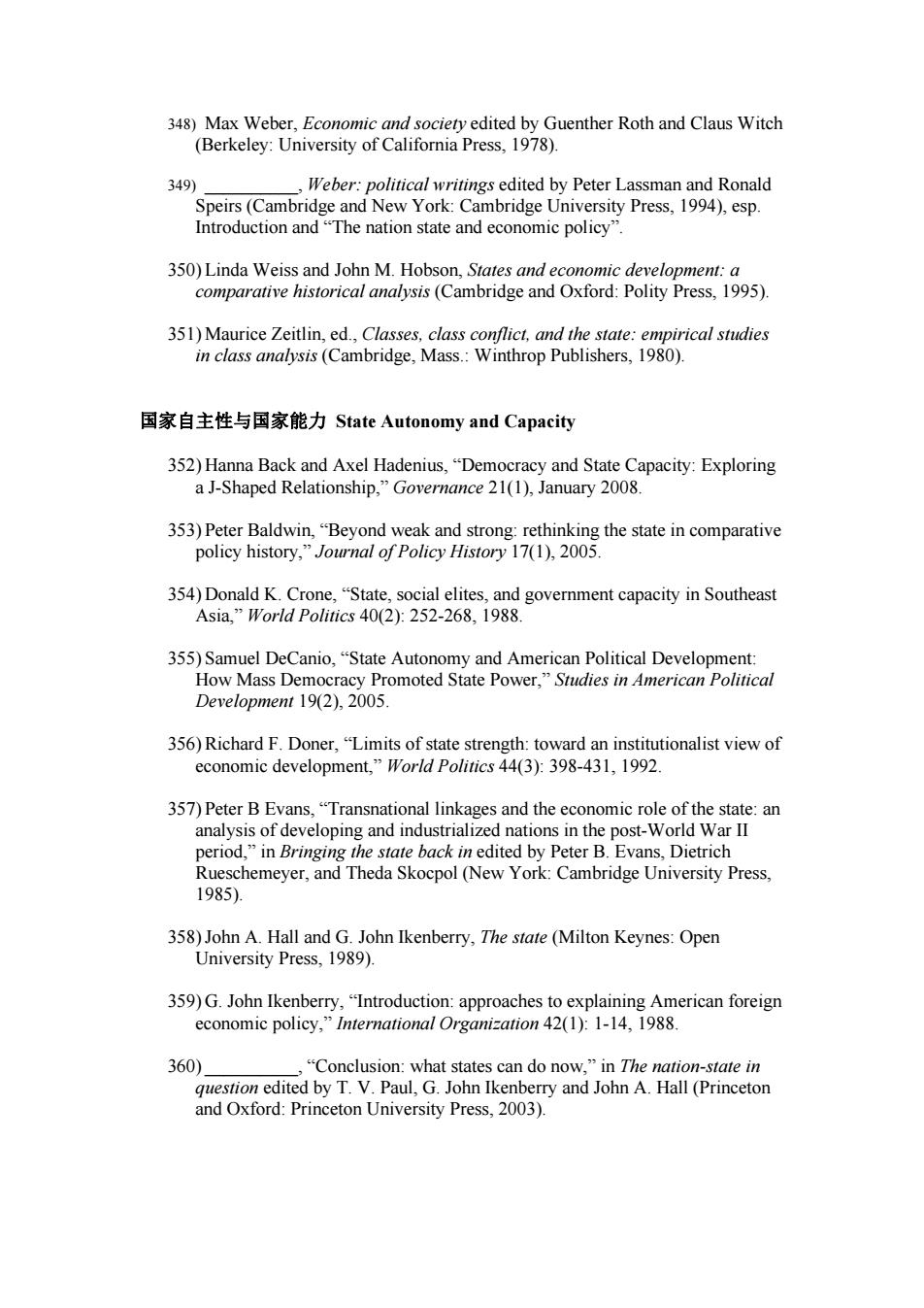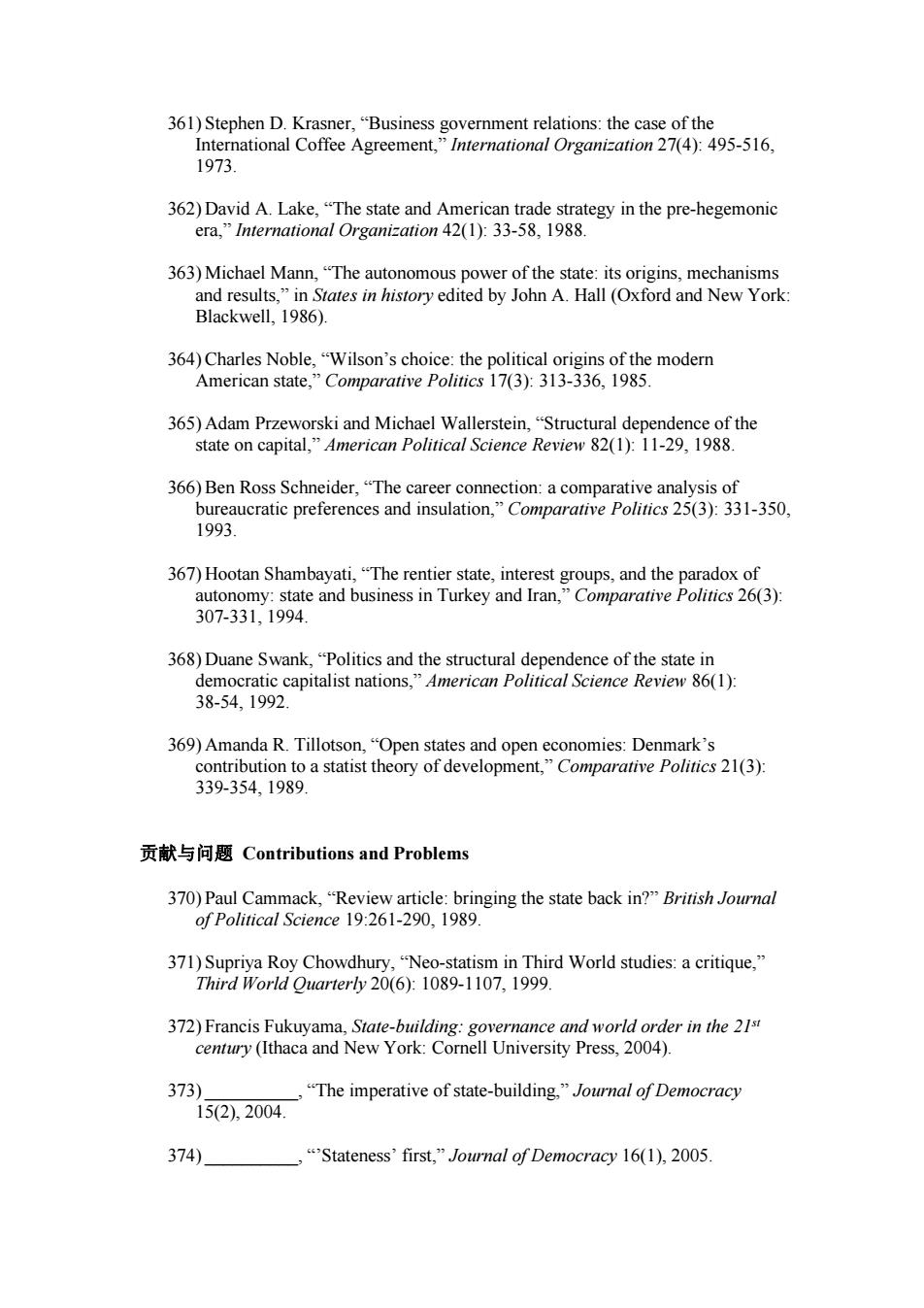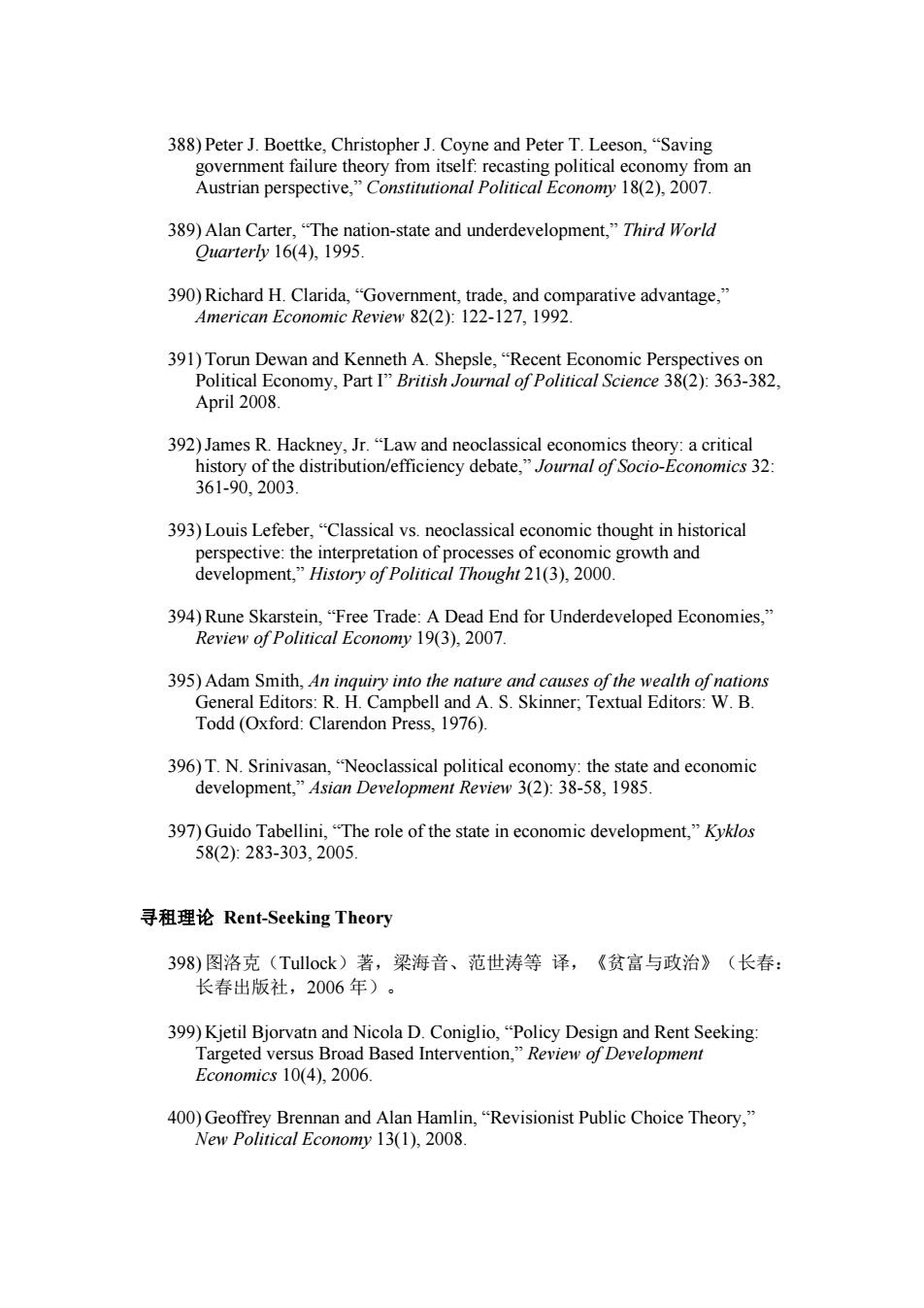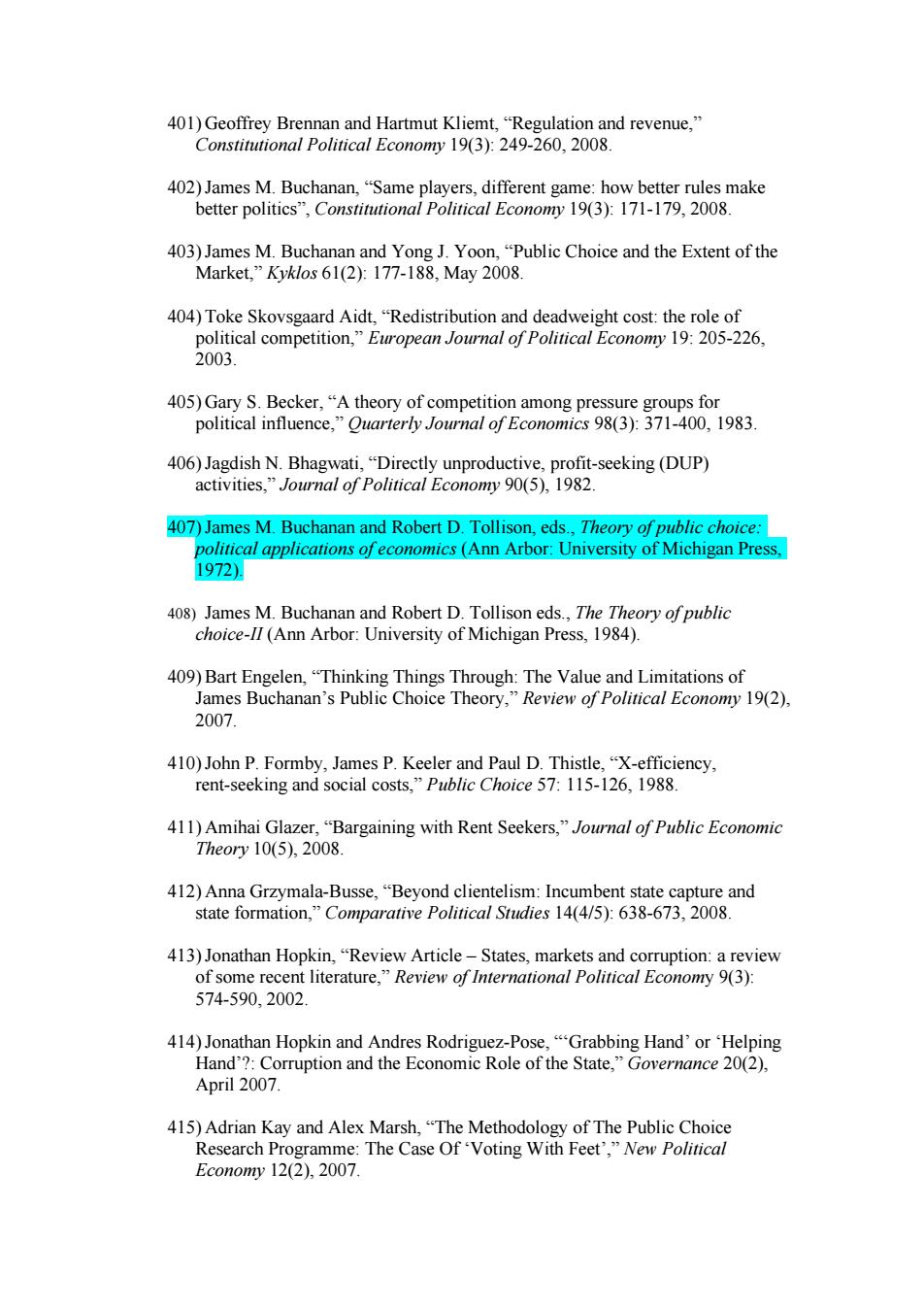
348)Max Weber,Economic and society edited by Guenther Roth and Claus Witch (Berkeley:University of California Press,1978) 349) Weber:political writings edited by Peter Lassman and Ronald Speirs(Cambridge and New York:Cambridge University Press,1994),esp. Introduction and "The nation state and economic policy". 350)Linda Weiss and John M.Hobson,States and economic development:a comparative historical analysis (Cambridge and Oxford:Polity Press,1995). 351)Maurice Zeitlin,ed.,Classes,class conflict,and the state:empirical studies in class analysis(Cambridge,Mass.:Winthrop Publishers,1980). 国家自主性与国家能力State Autonomy and Capacity 352)Hanna Back and Axel Hadenius,"Democracy and State Capacity:Exploring a J-Shaped Relationship,"Governance 21(1),January 2008. 353)Peter Baldwin,"Beyond weak and strong:rethinking the state in comparative policy history,"Journal of Policy History 17(1),2005. 354)Donald K.Crone,"State,social elites,and government capacity in Southeast Asia,"World Politics 40(2):252-268,1988. 355)Samuel DeCanio,"State Autonomy and American Political Development: How Mass Democracy Promoted State Power,"Studies in American Political Development 19(2),2005 356)Richard F.Doner,"Limits of state strength:toward an institutionalist view of economic development,"World Politics 44(3):398-431,1992 357)Peter B Evans,"Transnational linkages and the economic role of the state:an analysis of developing and industrialized nations in the post-World War II period,"in Bringing the state back in edited by Peter B.Evans,Dietrich Rueschemeyer,and Theda Skocpol (New York:Cambridge University Press, 1985) 358)John A.Hall and G.John Ikenberry,The state (Milton Keynes:Open University Press,1989). 359)G.John Ikenberry,"Introduction:approaches to explaining American foreign economic policy,"International Organization 42(1):1-14,1988. 360) "Conclusion:what states can do now,"in The nation-state in question edited by T.V.Paul,G.John Ikenberry and John A.Hall(Princeton and Oxford:Princeton University Press,2003)
348) Max Weber, Economic and society edited by Guenther Roth and Claus Witch (Berkeley: University of California Press, 1978). 349) __________, Weber: political writings edited by Peter Lassman and Ronald Speirs (Cambridge and New York: Cambridge University Press, 1994), esp. Introduction and “The nation state and economic policy”. 350) Linda Weiss and John M. Hobson, States and economic development: a comparative historical analysis (Cambridge and Oxford: Polity Press, 1995). 351) Maurice Zeitlin, ed., Classes, class conflict, and the state: empirical studies in class analysis (Cambridge, Mass.: Winthrop Publishers, 1980). 国家自主性与国家能力 State Autonomy and Capacity 352) Hanna Back and Axel Hadenius, “Democracy and State Capacity: Exploring a J-Shaped Relationship,” Governance 21(1), January 2008. 353) Peter Baldwin, “Beyond weak and strong: rethinking the state in comparative policy history,” Journal of Policy History 17(1), 2005. 354) Donald K. Crone, “State, social elites, and government capacity in Southeast Asia,” World Politics 40(2): 252-268, 1988. 355) Samuel DeCanio, “State Autonomy and American Political Development: How Mass Democracy Promoted State Power,” Studies in American Political Development 19(2), 2005. 356) Richard F. Doner, “Limits of state strength: toward an institutionalist view of economic development,” World Politics 44(3): 398-431, 1992. 357) Peter B Evans, “Transnational linkages and the economic role of the state: an analysis of developing and industrialized nations in the post-World War II period,” in Bringing the state back in edited by Peter B. Evans, Dietrich Rueschemeyer, and Theda Skocpol (New York: Cambridge University Press, 1985). 358)John A. Hall and G. John Ikenberry, The state (Milton Keynes: Open University Press, 1989). 359) G. John Ikenberry, “Introduction: approaches to explaining American foreign economic policy,” International Organization 42(1): 1-14, 1988. 360) __________, “Conclusion: what states can do now,” in The nation-state in question edited by T. V. Paul, G. John Ikenberry and John A. Hall (Princeton and Oxford: Princeton University Press, 2003)

361)Stephen D.Krasner,"Business government relations:the case of the International Coffee Agreement,"International Organization 27(4):495-516, 1973. 362)David A.Lake,"The state and American trade strategy in the pre-hegemonic era,"International Organization 42(1):33-58,1988. 363)Michael Mann,"The autonomous power of the state:its origins,mechanisms and results,"in States in history edited by John A.Hall (Oxford and New York: Blackwell,1986). 364)Charles Noble,"Wilson's choice:the political origins of the modern American state,"Comparative Politics 17(3):313-336,1985. 365)Adam Przeworski and Michael Wallerstein,"Structural dependence of the state on capital,"American Political Science Review 82(1):11-29,1988. 366)Ben Ross Schneider,"The career connection:a comparative analysis of bureaucratic preferences and insulation,"Comparative Politics 25(3):331-350 1993. 367)Hootan Shambayati,"The rentier state,interest groups,and the paradox of autonomy:state and business in Turkey and Iran,"Comparative Politics 26(3): 307-331,1994. 368)Duane Swank,"Politics and the structural dependence of the state in democratic capitalist nations,"American Political Science Review 86(1): 38-54,1992 369)Amanda R.Tillotson,"Open states and open economies:Denmark's contribution to a statist theory of development,"Comparative Politics 21(3): 339-354,1989. 贡献与问题Contributions and Problems 370)Paul Cammack,"Review article:bringing the state back in?"British Journal of Political Science 19:261-290,1989. 371)Supriya Roy Chowdhury,"Neo-statism in Third World studies:a critique," Third World Quarterly 20(6):1089-1107,1999. 372)Francis Fukuyama,State-building:governance and world order in the 21s century (Ithaca and New York:Cornell University Press,2004). 373) "The imperative of state-building,"Journal of Democracy 15(2),2004. 374) "Stateness'first,"Journal of Democracy 16(1),2005
361) Stephen D. Krasner, “Business government relations: the case of the International Coffee Agreement,” International Organization 27(4): 495-516, 1973. 362) David A. Lake, “The state and American trade strategy in the pre-hegemonic era,” International Organization 42(1): 33-58, 1988. 363) Michael Mann, “The autonomous power of the state: its origins, mechanisms and results,” in States in history edited by John A. Hall (Oxford and New York: Blackwell, 1986). 364) Charles Noble, “Wilson’s choice: the political origins of the modern American state,” Comparative Politics 17(3): 313-336, 1985. 365) Adam Przeworski and Michael Wallerstein, “Structural dependence of the state on capital,” American Political Science Review 82(1): 11-29, 1988. 366) Ben Ross Schneider, “The career connection: a comparative analysis of bureaucratic preferences and insulation,” Comparative Politics 25(3): 331-350, 1993. 367) Hootan Shambayati, “The rentier state, interest groups, and the paradox of autonomy: state and business in Turkey and Iran,” Comparative Politics 26(3): 307-331, 1994. 368) Duane Swank, “Politics and the structural dependence of the state in democratic capitalist nations,” American Political Science Review 86(1): 38-54, 1992. 369) Amanda R. Tillotson, “Open states and open economies: Denmark’s contribution to a statist theory of development,” Comparative Politics 21(3): 339-354, 1989. 贡献与问题 Contributions and Problems 370) Paul Cammack, “Review article: bringing the state back in?” British Journal of Political Science 19:261-290, 1989. 371) Supriya Roy Chowdhury, “Neo-statism in Third World studies: a critique,” Third World Quarterly 20(6): 1089-1107, 1999. 372) Francis Fukuyama, State-building: governance and world order in the 21 st century (Ithaca and New York: Cornell University Press, 2004). 373) __________, “The imperative of state-building,” Journal of Democracy 15(2), 2004. 374) __________, “’Stateness’ first,” Journal of Democracy 16(1), 2005

375)John A.Hall and Ralph Schroeder,eds.An Anatomy of Power:The Social Theory of Michael Mann (New York:Cambridge University Press,2006) 376)Jack Hayward,"Review article:testing the limits of French statism," European of Journal of Political Theory 4(3):301-307,2005. 377)Tim Jacoby,"Method,narrative and historiography in Michael Mann's sociology of state development,"Sociological Review 52(3).2004. 378)Margaret Levi,"The state of the study of the state,"in Political science:the state of the discipline edited by Ira Katznelson and Helen V.Milner (New York:Norton;Washington,D.C.:American Political Science Association, 2002). 379)Joel S.Migdal,Strong societies and weak states:state-society relations and state capabilities in the Third World(Princeton:Princeton University Press, 1988) 380) "Studying the state,"in Comparative politics:rationality, culture,and structure edited by Mark Irving Lichbach and Alan S.Zuckerman (Cambridge:Cambridge University Press,1997). 381) State in society:studying how states and societies transform and constitute one another (New York:Cambridge University Press,2001), Chapter 1. 382)Joel S.Migdal,Atul Kohli and Vivienne Shue,eds.,State power and social forces:domination and transformation in the Third World (Cambridge and New York:Cambridge University Press,1994),Introduction and Chapter 1 383)Timothy Mitchell,"The limits of the state:beyond statist approaches and their critics,"American Political Science Review 85(1):77-96,1991. 384)Sylvia Walby,"The Myth of the Nation-State:Theorizing Society and Polities in a Global Era,"Sociology 37(3):529-546,2003. 385)Eshrak Zaky,"The State-Capital Relationship and the Significance of Incorporating the Role of Labor,"Research in Political Economy 22:65-83, 2005. 6。新古典政治经济学Neoclassical Political Economy 新古典政治经济学概述Introduction to Neoclassical Political Economy 386)Christian Arnsperger and Yanis Varoufakis,"What Is Neoclassical Economics?"Post-Autistic Economics Review 38(1),July 2006 387)Timothy Besley,"The New Political Economy,"Economic Journal 117(524). November 2007
375)John A. Hall and Ralph Schroeder, eds. An Anatomy of Power: The Social Theory of Michael Mann (New York: Cambridge University Press, 2006). 376)Jack Hayward, “Review article: testing the limits of French statism,” European of Journal of Political Theory 4(3): 301-307, 2005. 377) Tim Jacoby, “Method, narrative and historiography in Michael Mann’s sociology of state development,” Sociological Review 52(3), 2004. 378) Margaret Levi, “The state of the study of the state,” in Political science: the state of the discipline edited by Ira Katznelson and Helen V. Milner (New York: Norton; Washington, D.C.: American Political Science Association, 2002). 379) Joel S. Migdal, Strong societies and weak states: state-society relations and state capabilities in the Third World (Princeton: Princeton University Press, 1988). 380) __________, “Studying the state,” in Comparative politics: rationality, culture, and structure edited by Mark Irving Lichbach and Alan S. Zuckerman (Cambridge: Cambridge University Press, 1997). 381) __________, State in society: studying how states and societies transform and constitute one another (New York: Cambridge University Press, 2001), Chapter 1. 382)Joel S. Migdal, Atul Kohli and Vivienne Shue, eds., State power and social forces: domination and transformation in the Third World (Cambridge and New York: Cambridge University Press, 1994), Introduction and Chapter 1. 383) Timothy Mitchell, “The limits of the state: beyond statist approaches and their critics,” American Political Science Review 85(1): 77-96, 1991. 384) Sylvia Walby, “The Myth of the Nation-State: Theorizing Society and Polities in a Global Era,” Sociology 37(3): 529-546, 2003. 385) Eshrak Zaky, “The State-Capital Relationship and the Significance of Incorporating the Role of Labor,” Research in Political Economy 22: 65-83, 2005. 6。新古典政治经济学 Neoclassical Political Economy 新古典政治经济学概述 Introduction to Neoclassical Political Economy 386) Christian Arnsperger and Yanis Varoufakis, “What Is Neoclassical Economics?” Post-Autistic Economics Review 38(1), July 2006. 387) Timothy Besley, “The New Political Economy,” Economic Journal 117(524), November 2007

388)Peter J.Boettke,Christopher J.Coyne and Peter T.Leeson,"Saving government failure theory from itself:recasting political economy from an Austrian perspective,"Constitutional Political Economy 18(2),2007. 389)Alan Carter,"The nation-state and underdevelopment,"Third World Quarterly 16(4),1995. 390)Richard H.Clarida,"Government,trade,and comparative advantage," American Economic Review 82(2):122-127,1992. 391)Torun Dewan and Kenneth A.Shepsle,"Recent Economic Perspectives on Political Economy,Part I"British Journal of Political Science 38(2):363-382, April 2008. 392)James R.Hackney,Jr."Law and neoclassical economics theory:a critical history of the distribution/efficiency debate,"Journal of Socio-Economics 32: 361-90.2003 393)Louis Lefeber,"Classical vs.neoclassical economic thought in historical perspective:the interpretation of processes of economic growth and development,"History of Political Thought 21(3),2000. 394)Rune Skarstein,"Free Trade:A Dead End for Underdeveloped Economies," Review of Political Economy 19(3),2007 395)Adam Smith,An inguiry into the nature and causes of the wealth of nations General Editors:R.H.Campbell and A.S.Skinner;Textual Editors:W.B. Todd(Oxford:Clarendon Press,1976) 396)T.N.Srinivasan,"Neoclassical political economy:the state and economic development,"Asian Development Review 3(2):38-58,1985 397)Guido Tabellini,"The role of the state in economic development,"Kyklos 58(2):283-303,2005. 寻租理论Rent-Seeking Theory 398)图洛克(Tullock)著,梁海音、范世涛等译,《贫富与政治》(长春: 长春出版社,2006年)。 399)Kjetil Bjorvatn and Nicola D.Coniglio,"Policy Design and Rent Seeking: Targeted versus Broad Based Intervention,"Review of Development Economics 10(4),2006. 400)Geoffrey Brennan and Alan Hamlin,"Revisionist Public Choice Theory," New Political Economy 13(1),2008
388) Peter J. Boettke, Christopher J. Coyne and Peter T. Leeson, “Saving government failure theory from itself: recasting political economy from an Austrian perspective,” Constitutional Political Economy 18(2), 2007. 389) Alan Carter, “The nation-state and underdevelopment,” Third World Quarterly 16(4), 1995. 390) Richard H. Clarida, “Government, trade, and comparative advantage,” American Economic Review 82(2): 122-127, 1992. 391) Torun Dewan and Kenneth A. Shepsle, “Recent Economic Perspectives on Political Economy, Part I” British Journal of Political Science 38(2): 363-382, April 2008. 392)James R. Hackney, Jr. “Law and neoclassical economics theory: a critical history of the distribution/efficiency debate,” Journal of Socio-Economics 32: 361-90, 2003. 393) Louis Lefeber, “Classical vs. neoclassical economic thought in historical perspective: the interpretation of processes of economic growth and development,” History of Political Thought 21(3), 2000. 394) Rune Skarstein, “Free Trade: A Dead End for Underdeveloped Economies,” Review of Political Economy 19(3), 2007. 395) Adam Smith, An inquiry into the nature and causes of the wealth of nations General Editors: R. H. Campbell and A. S. Skinner; Textual Editors: W. B. Todd (Oxford: Clarendon Press, 1976). 396) T. N. Srinivasan, “Neoclassical political economy: the state and economic development,” Asian Development Review 3(2): 38-58, 1985. 397) Guido Tabellini, “The role of the state in economic development,” Kyklos 58(2): 283-303, 2005. 寻租理论 Rent-Seeking Theory 398) 图洛克(Tullock)著,梁海音、范世涛等 译,《贫富与政治》(长春: 长春出版社,2006 年)。 399) Kjetil Bjorvatn and Nicola D. Coniglio, “Policy Design and Rent Seeking: Targeted versus Broad Based Intervention,” Review of Development Economics 10(4), 2006. 400) Geoffrey Brennan and Alan Hamlin, “Revisionist Public Choice Theory,” New Political Economy 13(1), 2008

401)Geoffrey Brennan and Hartmut Kliemt,"Regulation and revenue," Constitutional Political Economy 19(3):249-260,2008. 402)James M.Buchanan,"Same players,different game:how better rules make better politics",Constitutional Political Economy 19(3):171-179,2008. 403)James M.Buchanan and Yong J.Yoon,"Public Choice and the Extent of the Market,"Kyklos 61(2):177-188,May 2008. 404)Toke Skovsgaard Aidt,"Redistribution and deadweight cost:the role of political competition,"European Journal of Political Economy 19:205-226, 2003. 405)Gary S.Becker,"A theory of competition among pressure groups for political influence,"Ouarterly Journal of Economics 98(3):371-400,1983 406)Jagdish N.Bhagwati,"Directly unproductive,profit-seeking(DUP) activities,"Journal of Political Economy 90(5),1982 407)James M.Buchanan and Robert D.Tollison,eds.,Theory of public choice: political applications ofeconomics(Ann Arbor:University of Michigan Press, 1972) 408)James M.Buchanan and Robert D.Tollison eds.,The Theory ofpublic choice-II(Ann Arbor:University of Michigan Press,1984). 409)Bart Engelen,"Thinking Things Through:The Value and Limitations of James Buchanan's Public Choice Theory,"Review of Political Economy 19(2), 2007. 410)John P.Formby,James P.Keeler and Paul D.Thistle,"X-efficiency, rent-seeking and social costs,"Public Choice 57:115-126,1988. 411)Amihai Glazer,"Bargaining with Rent Seekers,"Journal of Public Economic Theory10(5),2008. 412)Anna Grzymala-Busse,"Beyond clientelism:Incumbent state capture and state formation,"Comparative Political Studies 14(4/5):638-673,2008. 413)Jonathan Hopkin,"Review Article-States,markets and corruption:a review of some recent literature,"Review of International Political Economy 9(3): 574-590,2002. 414)Jonathan Hopkin and Andres Rodriguez-Pose,"Grabbing Hand'or 'Helping Hand'?:Corruption and the Economic Role of the State,"Governance 20(2), April 2007. 415)Adrian Kay and Alex Marsh,"The Methodology of The Public Choice Research Programme:The Case Of 'Voting With Feet',"New Political Economy12(2),2007
401) Geoffrey Brennan and Hartmut Kliemt, “Regulation and revenue,” Constitutional Political Economy 19(3): 249-260, 2008. 402)James M. Buchanan, “Same players, different game: how better rules make better politics”, Constitutional Political Economy 19(3): 171-179, 2008. 403)James M. Buchanan and Yong J. Yoon, “Public Choice and the Extent of the Market,” Kyklos 61(2): 177-188, May 2008. 404) Toke Skovsgaard Aidt, “Redistribution and deadweight cost: the role of political competition,” European Journal of Political Economy 19: 205-226, 2003. 405) Gary S. Becker, “A theory of competition among pressure groups for political influence,” Quarterly Journal of Economics 98(3): 371-400, 1983. 406)Jagdish N. Bhagwati, “Directly unproductive, profit-seeking (DUP) activities,” Journal of Political Economy 90(5), 1982. 407)James M. Buchanan and Robert D. Tollison, eds., Theory of public choice: political applications of economics (Ann Arbor: University of Michigan Press, 1972). 408) James M. Buchanan and Robert D. Tollison eds., The Theory of public choice-II (Ann Arbor: University of Michigan Press, 1984). 409) Bart Engelen, “Thinking Things Through: The Value and Limitations of James Buchanan’s Public Choice Theory,” Review of Political Economy 19(2), 2007. 410)John P. Formby, James P. Keeler and Paul D. Thistle, “X-efficiency, rent-seeking and social costs,” Public Choice 57: 115-126, 1988. 411) Amihai Glazer, “Bargaining with Rent Seekers,” Journal of Public Economic Theory 10(5), 2008. 412) Anna Grzymala-Busse, “Beyond clientelism: Incumbent state capture and state formation,” Comparative Political Studies 14(4/5): 638-673, 2008. 413)Jonathan Hopkin, “Review Article – States, markets and corruption: a review of some recent literature,” Review of International Political Economy 9(3): 574-590, 2002. 414)Jonathan Hopkin and Andres Rodriguez-Pose, “‘Grabbing Hand’ or ‘Helping Hand’?: Corruption and the Economic Role of the State,” Governance 20(2), April 2007. 415) Adrian Kay and Alex Marsh, “The Methodology of The Public Choice Research Programme: The Case Of ‘Voting With Feet’,” New Political Economy 12(2), 2007